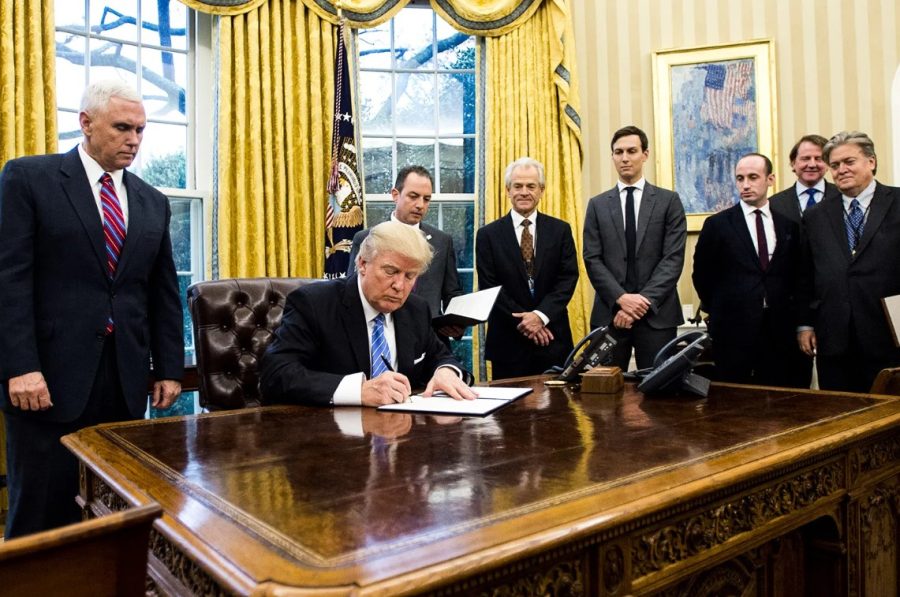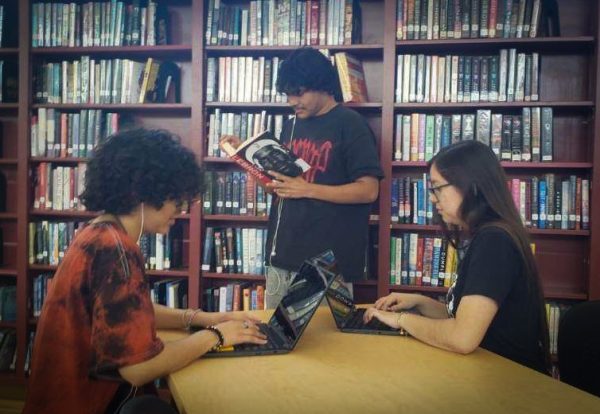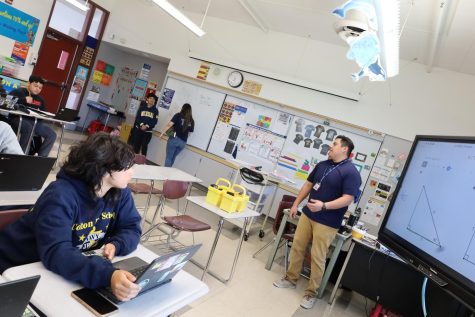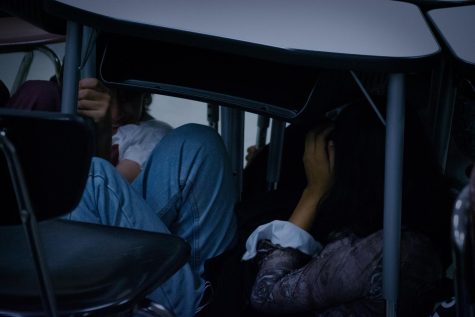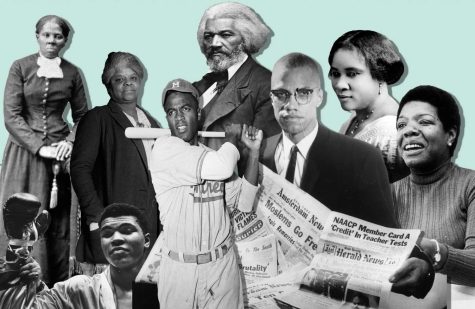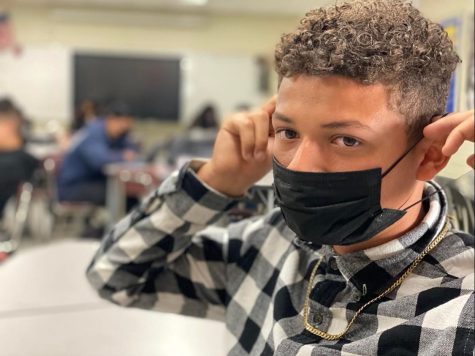Opinion: When it comes to womens’ health rights, they need to have control of the table
With the upcoming Supreme Court overrule of Roe v. Wade, the question about who gets a say about women’s health issues is becoming a bigger question.
Courtesy Vanity Fair; Susan Walsh/AP Images
With the upcoming overturn on the 1973 Roe v. Wade Supreme Court decision, this image came to the mind of CA Assemblyperson Eloise Gomez Reyes, who remembered when a group of men, led by Donald Trump, signed a maternity law in 2017 that stopped U.S. dollars from being given to international women’s health organizations.
The Supreme court will release its decision on the case of Dobbs v. Jackson Women’s Health Organization later this month, which will have major implications in regards to a woman’s constitutional right to have an abortion, which was won through the Roe v. Wade case in 1973.
At the beginning of May, a draft of the decision for Dobbs v. Jackson, written by Justice Samuel Alito, was leaked to the press, revealing that the Supreme Court has every intention of repealing Roe v. Wade, putting an end to a woman’s abortion rights nationwide. Alito’s comments in the leaked document indicate a hostility towards the law. “Roe was egregiously wrong from the start,” he wrote.
To say the least about this attempt: it’s absolutely ridiculous. Abortion should fully be a woman’s choice. Whether or not a someone gets an abortion does not affect anyone but the person receiving it.
When you looked around the table, there wasn’t a single woman. So here you have a group of high level decision makers deciding an issue about maternity care which has to do with the woman, not with a man. Yet there wasn’t a woman included.
— Eloise Gomez Reyes, CA Assembly Majority Leader
Which is why it is so alarming to see so many men at the center of making decisions about what should happen with womens’ bodies.
California Assembly Majority Leader Ms. Eloise Gomez Reyes (D-Colton) expressed the same opinion, standing up for women’s rights and equal treatment between genders.
“There is one photo and it was during the Trump Administration when they were trying to decide issues regarding maternity care,” Gomez Reyes shared. “And sitting around the table were 15 to 20 individuals in this discussion. When you looked around the table, there wasn’t a single woman. So here you have a group of high level decision makers deciding an issue about maternity care which has to do with the woman, not with a man. Yet there wasn’t a woman included.”
Men often include themselves in women’s rights debates, sucking all the oxygen out of the room so women can’t speak for themselves. That is not to say men can’t talk on the topic. Anyone is open to debate in general, but it’s a problem when someone becomes too overbearing on topics that don’t really involve them.
Unless you have an actual professional opinion or legitimate say in a person’s well being, then you should not be inserting yourself in someone else’s plans to get an abortion.
The whole point of abortion is that women might have the choice to do what is best for their own personal health.
It would definitely be beneficial to have more female politicians speaking about these topics (or speaking in general). It would make more sense for a debate regarding women’s issues to be held at a table surrounded by women.
Just throwing this out there.
Luckily we have women like Assemblyperson Gomez Reyes taking a stand for women’s rights.
She added, “The bottom line is that if you think you know better for someone else—unless there is an issue where that person doesn’t understand what they’re deciding—once you’ve explained it, that’s as far as you can go. And after that it’s 100% that woman’s decision on what she’s going to do.”
The problem is that a lot of these decisions are being made for religious reasons, despite the fact that we live in a culture whose Constitution makes it clear we should have a separation of church and state. Not everyone shares the same religious or personal values, so it is up to the state to make the best decisions that allow for the individual to make choices that are best suited for themselves.
Denise Diaz, National Honor Society President, Young Legislator Program graduate, and next year’s Senior Class President, expressed her discontent with the Supreme Court’s decision the same way.
“Although it may be taboo to say, I believe the true root of the issue comes with embedding religious beliefs into decision making in our government,” Diaz said. “Thomas Jefferson said it best, that there is a need for ‘separation of church and state’ especially when it comes to women’s rights which should be non-negotiable.”
Taking away women’s abortion rights doesn’t necessarily mean that women won’t get abortions anymore either. You’ve simply taken away the safe and legal way to do it.
This decision will push some women to use dangerous methods for abortion since they won’t be able to access professional help. An overturn of abortion laws would be debilitating towards women’s health and runs the risk for more abortion-related injuries.
Abortion restrictions are foolish and we should trust people to make medical decisions in their own best interest. Unless you’re a doctor saying getting an abortion will guarantee death for a woman and her unborn child, I don’t see much reason to listen.
I guess the same could be said for me, a 16-year-old girl who writes for her school newspaper in the dark of her room every other night. I can’t possibly have an opinion on this stuff right?
Recently, the CHS Publications Department experienced a major theft as over $20,000 in photography equipment was stolen from our studio over Spring Break. This included all cameras. Any amount you donate will help rebuild our program. Thank you!
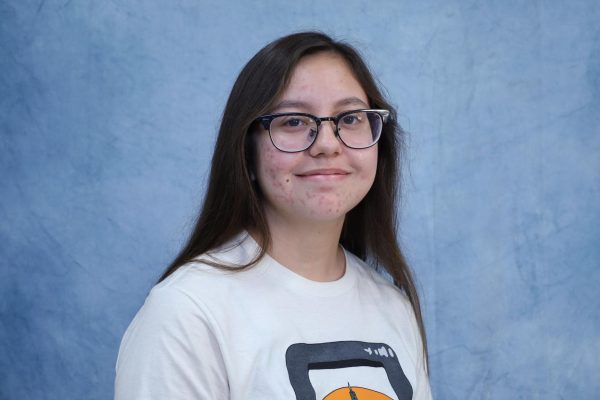
Erin Dallatorre has finally hit her senior year at Colton High School. After three long years of writing for the Pepper Bough and winning Journalist...




